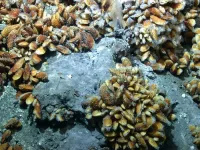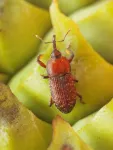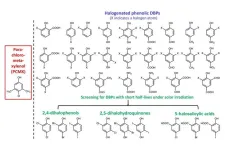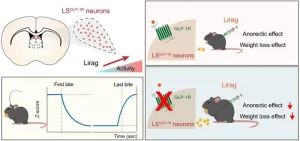(Press-News.org) Newborn babies have one of three pioneer bacteria in their gut shortly after birth, one of which could be used to develop new personalised infant therapeutic probiotics, researchers show.
In the largest study of UK baby microbiomes to date, researchers from the Wellcome Sanger Institute, University College London (UCL), and the University of Birmingham, used whole genome sequencing to analyse stool samples from 1,288 healthy infants, all under one month old from the UK Baby Biome Study1.
This research, published today (6 September) in Nature Microbiology, found that one of these beneficial bacterial pioneers was genetically adapted to make full use of the nutrients in breast milk, suggesting that it is the most suited to thrive in a baby’s microbiome. The team uncovered that this bacterium can also block pathogens from colonising the babies’ gut, highlighting its significant potential as a natural probiotic.
The findings could support the development of infant formulas and therapeutic probiotics containing the most effective natural strains for the baby's gut. Currently, most commercial infant probiotics contain a different bacterial strain not found in the early microbiomes of infants in industrialised societies like the UK and the US2,3.
In addition to the two beneficial pioneer bacteria, researchers highlighted a third bacterium that is considered risky as it can lead to the colonisation of antibiotic-resistant bacteria. This can interfere with the development of the infant microbiome and increase the risk of pathogens colonising the gut.
In the future, it could be possible to predict how a baby’s gut will develop by mapping their gut microbiome profile right after birth to assess which pioneer bacteria they have. If needed, a personalised probiotic could be provided to help promote healthy microbiome development and protect against potentially pathogenic infections.
Further research such as the Microbes, Milk, Mental Health and Me (4M) project is needed to understand the impact of pioneer bacteria on health.4 This project, co-led by the Wellcome Sanger Institute, is part of the Children Growing Up in Liverpool study involving 10,000 mothers and infants. This extensive research seeks to explore how factors such as the infant gut microbiome and early life feeding affect brain development, behaviour, emotions and mental health later in life.
The gut microbiome is a complex ecosystem of millions of microbes that are vital for human health and important in immune system development. As it begins to form immediately at birth, the first month is the earliest window for intervention with probiotics that could be used to restore or boost the microbiome. However, before this study, there was a lack of high-resolution data showing how the microbiome develops in this period of life, and which bacteria would be the most useful in healthy newborns.
Building on a previous UK Baby Biome Study that showed babies born by vaginal birth had a different microbiome compared to those born via caesarean5, this new research analysed an expanded dataset of 2,387 stool samples from 1,288 UK infants born in hospitals and some of their mothers. The team from the Wellcome Sanger Institute, UCL, and the University of Birmingham, found that all newborns fell into one of three microbiome profiles, each characterised by a different dominant pioneer bacterium.
Out of these pioneer bacteria, Bifidobacterium longum subsp. longum (B. longum) and Bifidobacterium breve (B. breve) are considered beneficial as they promote the stable colonisation of other beneficial microbes, and Enterococcus faecalis (E. faecalis) is considered risky.
B. longum was found to come from the mother’s gut during childbirth, however, the team found that B. breve was not transmitted in this way6. The team also uncovered that B. breve was genetically adapted to fully utilise the nutrients found in breast milk and can block potentially damaging pathogens from colonising the babies’ guts.
Around 85 per cent of the babies studied were breastfed in the first few weeks of life. Researchers found that breastfeeding versus formula feeding did not seem to influence the type of pioneer bacteria in the baby’s gut, however the use of antibiotics did7. Researchers highlight that other factors such as maternal age and how many times someone has given birth may also play a role, but further research is needed to investigate this and the impact on long-term health outcomes.
They also showed that a bacterium commonly found in commercial infant probiotics known as Bifidobacterium longum subsp. infantis (B. infantis) was not a pioneer bacterium, and is rare in UK infants. This finding is aligned with research from other Western industrialised countries that also shows a lack of naturally occurring B. infantis in early infant microbiomes2,3 and suggests that B. breve could be a more effective natural probiotic.
Dr Yan Shao, first author from the Wellcome Sanger Institute, said: “If we think of a newborn baby’s gut as an ecosystem that starts to establish right from birth, there was very little known about which and how microbes plant the very first seeds to establish themselves before the findings of the UK Baby Biome Study. By analysing the high-resolution genomic information from over 1,200 babies, we have identified three pioneer bacteria that drive the development of the gut microbiota, allowing us to group them into infant microbiome profiles. Being able to see the make-up of these ecosystems and how they differ is the first step in developing effective personalised interventions to help support a healthy microbiome.”
Professor Louise Kenny, Lead Investigator of the Children Growing up in Liverpool study from the University of Liverpool, said: “Decisions around mode of childbirth and breastfeeding are complex and personal, and it’s important to note that there is no one size fits all approach when it comes to what the best options are for you and your baby. It is also important to note that we still have an incomplete understanding of how the role of mode of birth and different methods of infant feeding influence microbiome development and how this impacts later health. That’s why this research is vital. We must continue to find new ways to ensure that all children are supported to have the best possible start in life.”
Professor Nigel Field, study co-author from UCL, said: “While our study has shortlisted three pioneer bacteria as important for babies’ microbiome development, it remains to be determined if and how different pioneer bacteria affect health and diseases, both in childhood and later in life. The UK Baby Biome Study is actively following up participants to give clues about this, and now even bigger cohorts are needed to investigate the role of the infant microbiome on health.”
Dr Trevor Lawley, senior author from the Wellcome Sanger Institute, said: “The development of the microbiome at the beginning of a person's life could have huge implications for them later on. It is also a time when the use of infant probiotics could be highly effective, if we know what bacteria are both important and relevant to the target populations. Our study highlights a hugely beneficial pioneer bacterium that can fully digest breast milk and protect the newborn against harmful microbes. This has the potential to be a highly effective natural probiotic as it can already establish itself in the child’s gut, and I hope that our open-access study encourages the rational selection of probiotic strains and development of novel microbiome-based therapeutics built on genomic research.”
ENDS
Contact details:
Rachael Smith
Press Office
Wellcome Sanger Institute
Cambridge, CB10 1SA
07827979492
Email: press.office@sanger.ac.uk
Notes to Editors:
The researchers would like to thank the participating families for their time and contribution to the Baby Biome Study and the research midwives at the recruiting hospitals.
The UK Baby Biome study is a large-scale UK birth cohort study and biobank, with longitudinal follow-up through electronic health data linkage. It aims to understand how interactions between microorganisms, the immune system, and clinical, social, and behavioural factors during pregnancy and early life influence later health and disease. Stool samples were collected from newborns and mothers, along with vaginal swabs from the mothers and umbilical cord blood. Funded by Wellcome, it was a collaboration between the Wellcome Sanger Institute, UCL, the University of Birmingham and collaborating hospitals.
Ennis, D., Shmorak, S., Jantscher-Krenn, E. Yassour, M. (2024) Longitudinal quantification of Bifidobacterium longum subsp. infantis reveals late colonization in the infant gut independent of maternal milk HMO composition. Nature Communications. DOI: 10.1038/s41467-024-45209-y
Casaburi, G. et al. (2021) Metagenomic insights of the infant microbiome community structure and function across multiple sites in the United States. Scientific Reports. DOI: 10.1038/s41598-020-80583-9
Sanger Institute researchers and collaborators are building the most detailed dataset on microbiome development in the world to unlock new insights into human health, specifically focusing on how the microbiome impacts mental health. This project, called ‘Microbes, Milk, Mental Health and Me’ is part of the new Children Growing Up in Liverpool (C-GULL) study. Funded by Wellcome, this study will track the health of 10,000 babies and their families, from early pregnancy to childhood. It aims to unravel the complex interactions between genetics, environment and early life exposures on long-term health outcomes and seeks to explore how factors such as the infant gut microbiome and early life feeding affect brain development, behaviour, emotions and mental health later in life. Volunteer registration is currently live, for more information, please visit: https://www.cgullstudy.com/taking-part/
The previous study analysed 1,679 samples of gut bacteria from nearly 600 healthy babies and 175 mothers. It found that babies born vaginally have different gut bacteria than those delivered by caesarean. It showed that vaginally born babies got most of their gut bacteria from their mother’s gut, not their vagina as previously thought. Babies born via caesarean did not acquire the bacteria from their mothers and instead had more bacteria associated with hospital environments. The researchers found that the differences in gut bacteria between vaginally born and caesarean-delivered babies largely evened out by 1 year old. The full release can be found: https://www.sanger.ac.uk/news_item/babies-gut-bacteria-affected-delivery-method-baby-biome-project-shows/
While B. longum was found to come from the mother’s gut during childbirth, B. breve was not transmitted in this way. This study did not identify the exact source of transmission for this bacterium, however, researchers suggest that it could have been from another area of the mother, for example, the skin microbiome. It was also found to be more common in children whose mothers identified as Asian.
This study suggests that the use of antibiotics increases the chance of E. faecalis colonising infant guts, however, it is not clear if this has any long-term health impact. Profiling a newborn microbiome and developing personalised probiotic treatment could benefit infants with this microbiome profile.
Author interests:
Dr Trevor Lawley is also a co-founder and Chief Scientific Officer of Microbiotica, a clinic-ready biopharmaceutical company specialising in the development of precision live biotherapeutic products with lead products in immuno-oncology and inflammatory bowel disease.
Publication:
Y. Shao, C. Garcia-Mauriño, S. Clare, et al. (2024) Primary succession of Bifidobacteria drives pathogen resistance in neonatal microbiota assembly. Nature Microbiology. DOI: 10.1038/s41564-024-01804-9
Funding:
This research was funded by Wellcome and the Wellcome Sanger Institute.
Selected websites:
About UCL – London’s Global University
UCL is a diverse global community of world-class academics, students, industry links, external partners, and alumni. Our powerful collective of individuals and institutions work together to explore new possibilities.
Since 1826, we have championed independent thought by attracting and nurturing the world's best minds. Our community of more than 50,000 students from 150 countries and over 16,000 staff pursues academic excellence, breaks boundaries and makes a positive impact on real world problems.
The Times and Sunday Times University of the Year 2024, we are consistently ranked among the top 10 universities in the world and are one of only a handful of institutions rated as having the strongest academic reputation and the broadest research impact.
We have a progressive and integrated approach to our teaching and research – championing innovation, creativity and cross-disciplinary working. We teach our students how to think, not what to think, and see them as partners, collaborators and contributors.
For almost 200 years, we are proud to have opened higher education to students from a wide range of backgrounds and to change the way we create and share knowledge.
We were the first in England to welcome women to university education and that courageous attitude and disruptive spirit is still alive today. We are UCL.
https://www.ucl.ac.uk/| Follow @uclnews on Twitter | Read news at www.ucl.ac.uk/news/ | Listen to UCL podcasts on SoundCloud | View images on Flickr | Find out what’s on at UCL Minds
The University of Birmingham
The University of Birmingham is ranked amongst the world’s top 100 institutions. Its work brings people from across the world to Birmingham, including researchers, educators and more than 40,000 students from over 150 countries.
England’s first civic university, the University of Birmingham is proud to be rooted in of one of the most dynamic and diverse cities in the country. A member of the Russell Group and a founding member of the Universitas 21 global network of research universities, the University of Birmingham has been changing the way the world works for more than a century.
The University of Birmingham is a founding member of Birmingham Health Partners (BHP), a strategic alliance which transcends organisational boundaries to rapidly translate healthcare research findings into new diagnostics, drugs and devices for patients. Birmingham Health Partners is a strategic alliance between seven organisations who collaborate to bring healthcare innovations through to clinical application:
University of Birmingham
University Hospitals Birmingham NHS Foundation Trust
Birmingham Women's and Children's Hospitals NHS Foundation Trust
Aston University
The Royal Orthopaedic Hospital NHS Foundation Trust
Sandwell and West Birmingham Hospitals NHS Trust
West Midlands Academic Health Science Network
Birmingham and Solihull Mental Health NHS Foundation Trust
The Wellcome Sanger Institute
The Wellcome Sanger Institute is a world leader in genomics research. We apply and explore genomic technologies at scale to advance understanding of biology and improve health. Making discoveries not easily made elsewhere, our research delivers insights across health, disease, evolution and pathogen biology. We are open and collaborative; our data, results, tools, technologies and training are freely shared across the globe to advance science.
Funded by Wellcome, we have the freedom to think long-term and push the boundaries of genomics. We take on the challenges of applying our research to the real world, where we aim to bring benefit to people and society.
Find out more at www.sanger.ac.uk or follow us on Twitter, Instagram, Facebook, LinkedIn and on our Blog.
About Wellcome
Wellcome supports science to solve the urgent health challenges facing everyone. We support discovery research into life, health and wellbeing, and we’re taking on three worldwide health challenges: mental health, infectious disease and climate and health. https://wellcome.org/
END
Natural probiotic discovered in UK newborns microbiomes
2024-09-06
ELSE PRESS RELEASES FROM THIS DATE:
Hijacking the command center of the cell: nuclear parasites in deep-sea mussels
2024-09-06
Most animals live in intimate relationships with bacteria. Some of these bacteria live inside the cells of their hosts, but only very few are able to live inside cell organelles (structures inside the cell, like organs in the body). One group of bacteria have figured out how to colonize the nuclei of their hosts, a remarkable feat given that the nucleus is the control center of the cell.
To date, nothing is known about the molecular and cellular processes that these intranuclear bacteria use to infect and reproduce in animal hosts. A group of scientists from the Max Planck Institute for Marine Microbiology in Bremen, Germany, now presents the first in-depth analysis ...
The heat generated by the tissues of some plants has played a crucial role in the evolutionary history of insect pollination
2024-09-06
Thermogenesis is a process by which organisms generate internal heat. Although it is usually associated with animals, some plants have also developed this ability. This metabolic process allows certain parts of the plant, such as flowers and inflorescences, to raise their temperature above that of the surrounding environment. Today, these plants, which include cycads and some angiosperms (flowering plants), rely on insects for pollination. The heat they generate helps volatilize and disperse floral fragrances and other chemical compounds that attract insects such as beetles, flies, and ...
Global experts help nanomedicines DELIVER on healthcare promise
2024-09-06
They’re tiny drug-delivery systems 1000 times smaller than a human hair, but while nanomedicines have long been hailed as the future for treating debilitating and life-threatening diseases, their journey from lab to patient has many challenges.
Now, new findings from a global team of expert scientists in academia and industry has generated world-first research quality standards that will help slash costs and reduce the time it takes to develop advanced nanomedicine treatments and make them available for patients.
Published in Nature Nanotechnology today, and led by the University of South Australia’s Dr Paul Joyce and the University ...
Galaxies are much much bigger than we thought
2024-09-06
If this galaxy is typical, then the study, published today in Nature Astronomy, indicates that our galaxy is already interacting with its closest neighbour, Andromeda.
Where does a galaxy end and deep space begin? It seems like a simple question until you look more closely at the gas that surrounds galaxies, known as the circumgalactic medium.
The halo of gas surrounding the stellar disc accounts for about 70% of the mass of the galaxy – excluding dark matter – but until now has remained something of a mystery. In the past we have only been able to observe the gas by measuring the light from a background object, ...
AI helps distinguish dark matter from cosmic noise
2024-09-06
Dark matter is the invisible force holding the universe together – or so we think. It makes up around 85% of all matter and around 27% of the universe’s contents, but since we can’t see it directly, we have to study its gravitational effects on galaxies and other cosmic structures. Despite decades of research, the true nature of dark matter remains one of science’s most elusive questions.
According to a leading theory, dark matter might be a type of particle that barely ...
HKUST engineering researchers discover an effective and environment-friendly disinfectant
2024-09-06
A widely used disinfectant worldwide, chloroxylenol, has been associated with eco-toxicological threats in water environments due to its relatively high chemical stability and massive consumption. Researchers at the School of Engineering of the Hong Kong University of Science and Technology (HKUST) have discovered a promising alternative known as 2,6-dichlorobenzoquinone (2,6-DCQ), which works more effectively in combating certain common bacteria, fungi and viruses, and can be rapidly degraded and detoxified in receiving waters.
This groundbreaking study is led by Prof. ZHANG Xiangru from HKUST's ...
Excessive light pollution may increase risk of Alzheimer's, especially in younger people
2024-09-06
In some places around the globe, the lights never go off. Streetlights, roadway lighting, and illuminated signs can deter crime, make roads safer, and enhance landscaping. Undisrupted light, however, comes with ecological, behavioral, and health consequences.
In the US, some states have legislation in place to reduce light pollution; however, levels of light at night remain high in many parts of the country. Now, researchers there have investigated correlations between outside nightly light pollution and Alzheimer's disease (AD).
“We show that in the US there is a positive ...
Researchers reveal new central action target of the “weight loss miracle drug” GLP-1R agonists in mice
2024-09-06
A research group led by Prof. ZHU Yingjie from the Shenzhen Institute of Advanced Technology (SIAT) of the Chinese Academy of Sciences (CAS), has revealed the essential role of lateral septum (LS) neurons in mediating anorectic and weight-lowering effects of the anti-obesity drug— liraglutide in mice.
The study was published in the Journal of Clinical Investigation on Sep. 03.
Obesity is now among the top ten chronic diseases worldwide, causing a range of health issues and increasing the medical burden. Anti-obesity medications have shown greater efficacy than lifestyle changes and diet, with lower risks and fewer side effects ...
Youth igniting the flame of innovation: The third SynBio challenges held successfully in Shenzhen
2024-09-06
From August 7 to 10, the Third SynBio Challenges were held at the Guangming Tianan Cloud Park International Conference Center in Shenzhen, China.
The event was co-organized by Shenzhen Institute of Advanced Technology (SIAT) of the Chinese Academy of Sciences (CAS), Chinese Society of Biotechnology, Shenzhen University of Advanced Technology (SUAT), Shenzhen Institute of Synthetic Biology (iSynBio), Shenzhen Synthetic Biology Association, and the Shenzhen Industrial Innovation Center for Engineering Biology.
The SynBio Challenges aim to provide a platform for students to engage in exchange and competition within the synthetic biology ...
Broccoli and kale top the shopping list for lowering blood pressure
2024-09-06
Cruciferous vegetables, including broccoli, cabbage, kale, and cauliflower have been found to lower blood pressure, in comparison to root and squash vegetables, in middle-aged and older Australian adults with elevated blood pressure.
In a randomised, controlled, crossover trial, researchers from Edith Cowan University (ECU) found that consuming four serves a day of cruciferous vegetables resulted in a significant reduction in blood pressure, compared with four serves a day of root and squash vegetables including carrot, potato, sweet ...





